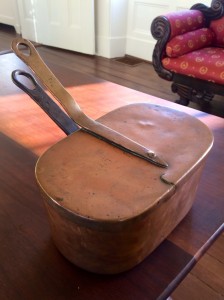Long Branch Plantation was lucky to have escaped much of the physical damage of the war. Apart from an individual account that a field was burned, the evidence shows that the estate remained unscathed. Most homesteads weren’t so fortunate. Many estates in the Shenandoah Valley were looted by both Union and Confederate soldiers for food and equipment, some had their slaves stolen from them, and some were burned to the ground.

Since all but the youngest and oldest men were required to join the army, women were often the only ones remaining to handle these disasters. The stories these women left behind show their bravery while the country was at war. Some of the tales are amusing: Elizabeth Heatwole, for example, successfully hid freshly baked pies from hungry Union soldiers under her baby in its crib. Some stories are heart wrenching: A woman named Frances Campbell discovered that her husband was dead when she spotted his knapsack on a federal soldier marching through her town. Inside were her husband’s blood-soaked shirts. Even more stories show the steel of the women whose husbands had gone off to war. Millwood local, Matella Cary Page Harrison, describes in a diary entry how she prepared to single-handedly fend off Union soldiers marching towards her home at nearby Carter Hall: “I jumped up and made great haste for home fearing they would tear everything to pieces… I had scarcely been at home an half hour when I heard the clattering of hoofs. I took my pistol in hand and rand down to the door determined to resist their entrance if they attempted it….”
Adelaide Nelson herself faced immense hardship during the Civil War. Her greenhouse was burned down by soldiers, and at one point during the war she felt under enough threat to bury her silverware and prized Marquis de Lafayette saucepan in the yard. The greatest tragedy occured when her husband Hugh died of a case of typhoid he contracted while campaigning. Her son, Hugh Jr., lost his leg in a farming accident just a year later. Adelaide was left with the full responsibility of maintaining Long Branch.
As hard as the men fought on the battlefields, the women fought just as hard to save their homes. Credit must be given to the bravery and unwavering determination of the women both Confederate and Union soldiers left behind.
-Casey Marion, Long Branch Plantation Intern
